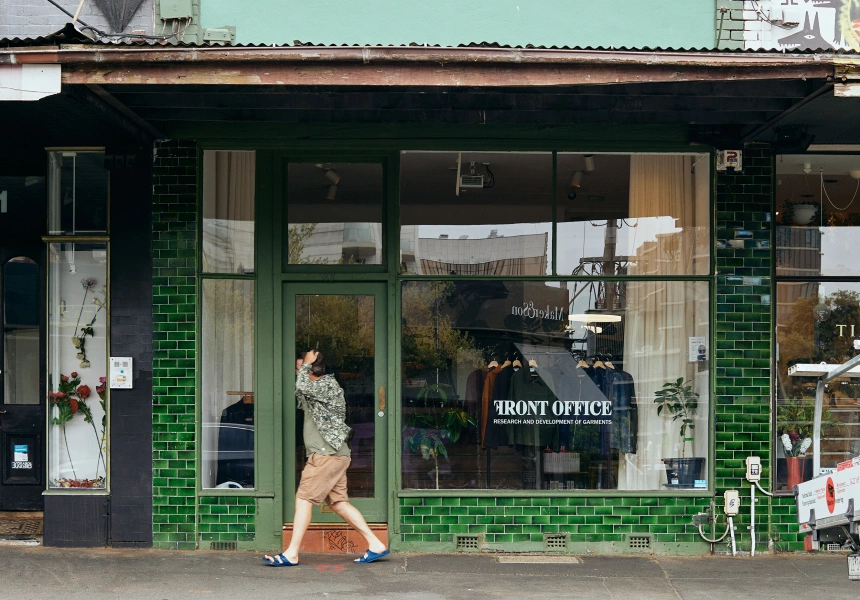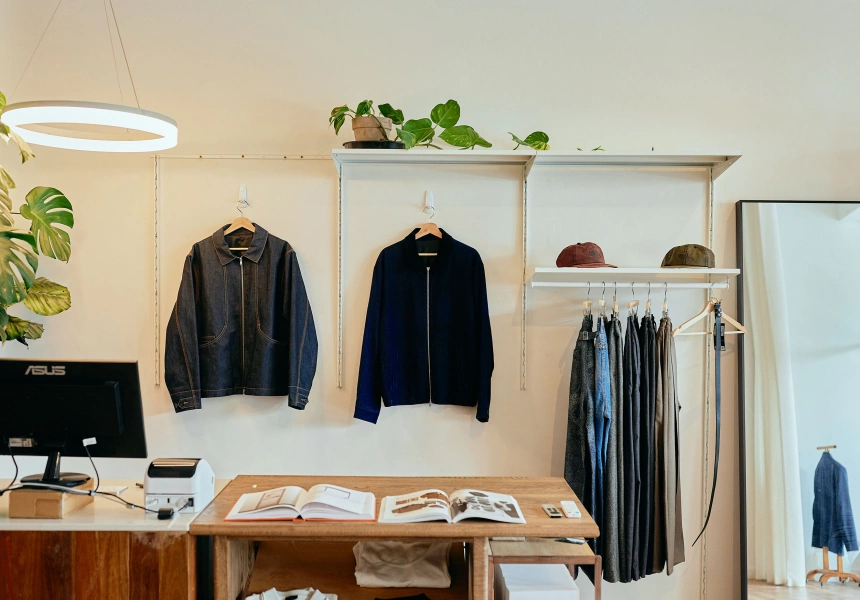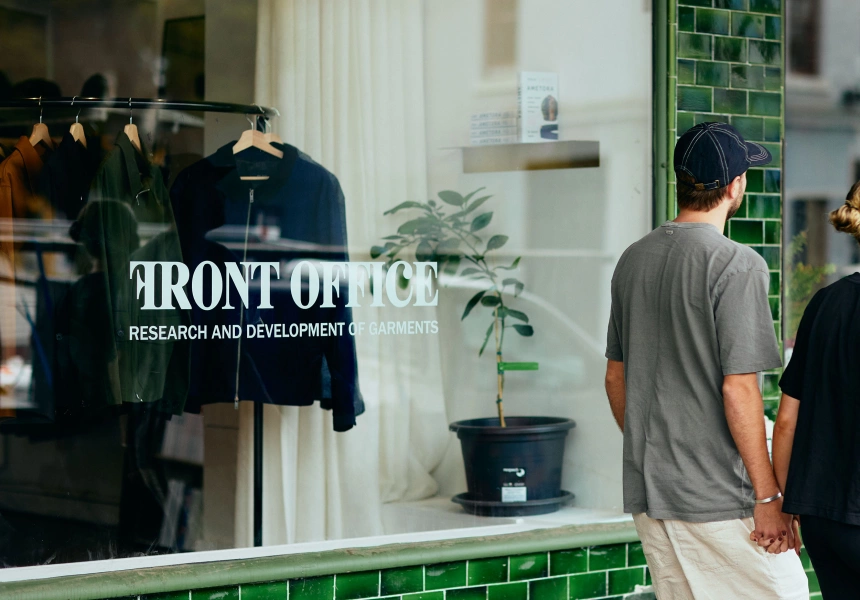Before Ken Sakata opened up shop on Fitzroy’s Smith Street, he wondered what previous lives the space had lived. What did he find online? “Broadsheet article after Broadsheet article announcing a new venture,” he tells, well, Broadsheet. “Oh my God, it’s like a graveyard of failed businesses,” he laughs.
Sakata says he’s since “exorcised the place” (sanded the floors). Front Office, his fashion label focused on utility-driven, contemporary menswear inspired by bygone eras, is the new venture residing in the (hopefully no longer cursed) shopfront. “I’m trying to access old ideas with new design,” he says of Front Office’s mission. Ask him in another six weeks and he says his answer will probably change.
That’s no surprise, given his fashion label is almost unrecognisable from what it was just one year ago. Sakata is part of the new vanguard of fashion designers whose success is largely thanks to internet virality. The doctor-turned-fashion-designer’s creative journey started back in 2022. On April Fool’s Day, he created a fake online persona pretending to be a footballer for the fictitious Queensland Football Club.
Join Broadsheet Access for exclusive invites to new venue openings in your city, plus other hot–ticket events. Membership starts at just $12 a month for an annual membership.
Join NowHe began to make merchandise for the made-up club and sold out his first drop in a matter of hours. “Queensland Football Club was my little naughty internet account,” he says. For a couple of years, the business model worked well – until Sakata wanted something more from his sartorial project.
His approach boxed him into creating garments that were “very Australian and very football-coded” for an audience mainly consisting of young, male sports fans in their 20s. On the cusp of forty and rarely a wearer of football shirts and hoodies, Sakata realised he was simply designing for a younger version of himself.
“I spent so much time on fabric, silhouette, pattern-making, doing things really expensively for the quality of the clothes and it really broke my heart when [customers] were like, ‘Oh, I’m sending this to my brother-in-law as a joke’.”
Over the last few years, Sakata has gone from screen-printing on blanks to manufacturing his own pieces locally. The switch-up from faux football merch to contemporary workwear wasn’t a simple one. “I kind of cheated a bit. I was like, ‘We’re making clothes for the managers and the coaches of the team’,” he says.
The first Front Office drop (when he still traded under Queensland Football Club) turned out to be about five times more successful than any of his other drops. The name change came when he was in Portugal seeking out manufacturers and was caught out trying to explain his “post-ironic internet kind of brain rot brand” to a 65-year-old man without social media.
“He’s looking at me like I have cheated him of his afternoon. He’s like, ‘You have the money and I know you have the enthusiasm, but I cannot do business with you because we do not understand whether this is just a one-time thing or that we will continue to be in business together’,” Sakata recounts.
So, in the middle of Portugal on hotel wi-fi, Sakata decided to officially pivot from Queensland Football Club to Front Office. “I just changed everything. I changed Instagram, the URLs, the emails, everything. My heart was really into making interesting, nice clothes, and no one was taking me seriously.”
Similarly, opening the physical store was less about having a retail spot and more about proving Front Office is a legitimate undertaking. It’s a “statement of intent that this is a real company,” Sakata says. Monday to Thursday, the space operates as an office for research and development. On weekends, it’s open to the public.
Sakata’s social media presence (a combined 780,000 followers on Instagram and TikTok) largely consists of educational videos deconstructing vintage designs and the history behind sartorial trends. Where he films – his desk, his lighting set-up – is exactly what you see in the shop.
There’s a no-frills approach to the shop fit-out. A lot of pieces are from Ikea, a handful from local carpentry businesses, and some fixtures were left over from previous tenants. Projected on the wall is archival film footage from walking tours of cities like Tokyo and New York, a nod to his sources of fabrics and inspiration.
Though half of his orders are international and only 4 per cent of his followers are from Melbourne, Sakata remains unfazed about what that means for his physical shop. “Most of [my followers] aren’t going to take part and buy a $400, $500 jacket,” he says.
Sakata wants the legacy of his label to be about shifting his audience’s perception of fashion; success looks like his customers being able to spot interesting designs and knowing the historical context behind particular styles. “And if that means that they don’t buy a jacket from me, but they go on eBay and find an old university jacket or something, I’ll be just as thrilled, to be honest,” he says.
The rapid evolution of Queensland Football Club into Front Office in the space of a couple of years proves that Sakata is on fertile ground. This winter, he’ll be launching womenswear. Next year, he’ll be unveiling a couple of big brand collaborations. Who knows what else the future holds?
“I’ll be [on Smith Street] for the next three years and then I’ll move onto something else,” Sakata says. “Either the business will be dead – touch wood – or the business will be too big and we’ll need to move somewhere else.”
Front Office
63 Smith St, Fitzroy
Opening Hours
Sat and Sun 10am–4pm



